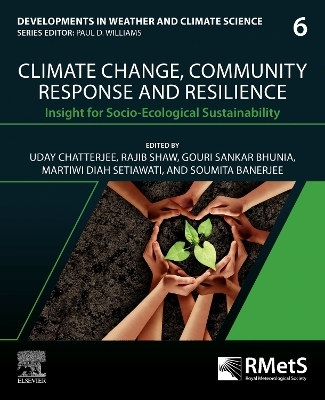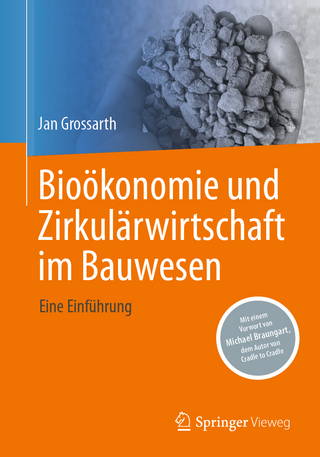
Climate Change, Community Response and Resilience
Elsevier - Health Sciences Division (Verlag)
978-0-443-18707-0 (ISBN)
Members of the Royal Meteorological Society are eligible for a 35% discount on all Developments in Weather and Climate Science series titles. See the RMetS member dashboard for the discount code.
Dr. Uday Chatterjee is an Assistant Professor at Bhatter College in Dantan, Paschim Medinipur, West Bengal, India, and an Applied Geographer with a Post-Graduate in Applied Geography from Utkal University and a Doctorate in Applied Geography from Ravenshaw University in Cuttack, Odisha. He has contributed to a number of research papers that have been published in reputable national and international publications, as well as edited book volumes. He has also organized (as the convener) a Faculty Development Program on "Modern ways of teaching and advanced research methods," which was funded by the Indian Council of Social Science Research (ICSSR). Urban Planning, Social and Human Geography, Applied Geomorphology, Hazards & Disasters, Environmental Issues, Land Use and Rural Development are some of his research interests. The West Bengal Pollution Control Board (WBPCB) of the Government of West Bengal, India, financed his research. He has worked as a reviewer for a number of international publications. Dr. Uday Chatterjee is currently the lead editor of the Springer Special Issue (S.I) on Urbanism, Smart Cities, and Modelling. Dr. Rajib Shaw is a professor at Keio University's Graduate School of Media and Governance. He is also the Chairperson of SEEDS Asia and CWS Japan, two Japanese NGOs, and a Senior Fellow of the Institute of Global Environmental Strategies (IGES) Japan. He was previously the Executive Director of the Integrated Research on Disaster Risk (IRDR) and a Kyoto University Professor. Disaster governance, community-based disaster risk management, climate change adaptation, urban risk management, and disaster and environmental education are all areas of interest for him. Professor Shaw is the Chair of the UN Science Technology Advisory Group for Disaster Risk Reduction (STAG) and the Co-Chair of the Asia Science Technology Academic Advisory Group (ASTAAG). He's also the CLA (Coordinating Lead Author) for the IPCC's 6th Assessment Report's Asia chapter. He is the editor-in-chief of the journal "Progress in Disaster Science" published by Elsevier, as well as the series editor of a Springer book series on disaster risk reduction. Prof. Shaw has over 45 books to his credit, as well as over 300 scholarly papers and book chapters. Dr. Gouri Sankar Bhunia earned his Ph.D. in 2015 from the University of Calcutta in India. His Ph.D. dissertation focused on applying geospatial technologies to prevent infectious disease in the environment. Environmental modeling, risk assessment, natural resource mapping and modeling, data mining, and information retrieval utilizing geospatial technologies are among his research interests. Dr. Bhunia serves on the editorial boards of three international journals in health GIS and geosciences as an associate editor. Dr. Bhunia has published more than 60 articles in Scopus-indexed publications. Dr. Martiwi Diah Setiawati is a research fellow at the National Research and Innovation Agency's Research Center for Oceanography (BRIN). She worked as a project researcher for the Climate Change Adaptation Initiative Project in Indonesia at The University of Tokyo's Integrated Research System for Sustainability Sciences (IR3S) from 2016 to March 2021. The Ministry of the Environment of Japan and the Ministry of National Development Planning of the Republic of Indonesia (BAPPENAS) are working together on this project to integrate climate change adaptation into a local development plan. She is interested in the use of remote sensing and GIS to a variety of environmental circumstances, such as habitat research, catastrophe mitigation, climate change effect assessment, and adaptation, as an environmental scientist. Her prior research efforts include constructing models to forecast future health hazards posed by changes in climate, land use, and population, as well as integrated climate assessment - risks, uncertainties, and society. She has over 20 papers published in a variety of international and regional journals and proceedings. Ms. Soumita Banerjee is a Senior Research Fellow (UGC) at the Department of Geography, Faculty Council of Science, Jadavpur University, Kolkata. She has completed her M.Sc. in Geography (Specialization in Environmental Study) with a Gold Medal from the Department of Geography, University of Calcutta and later, while working as full-time faculty in the Department of geography (UG-PG), Asutosh College, Kolkata, she has done a M.A in Disaster Management in the distance learning mode of Annamalai University. During her Research Period as a Junior Research Fellow, she has been awarded with DAAD- IGCS Summer School Scholarships twice and invited as a Guest Researcher in ERASMUS Exchange Programme. She has also selected and participated in various prestigious national level training programmes or schools. Her areas of research interest cover Land Use Dynamics and Urban Planning, Hazards & Disasters, and Environmental Issues. So far, she has contributed as an author and a reviewer in a numbers of research journals and books in home and abroad.
Section I Introduction 1. Theoretical framework of climate change, community response, and resilience 2. Climate Change, Community Response and Resilience: A Paradigm Shift
Section II Climate Change, Social Response and Resilience 3. The Roles of Community Resilience and Risk Appraisal in Climate 4. Local Strategies to Build Climate Resilient Communities 5. Community-Based Responses to Climate Hazards 6. Community-Based Tourism as a Strategy for Building Climate Resilience 7. Climate Change on Community Mental Health 8. Vulnerability and Resilience to Climate Change in Coastal Community 9. Livelihood Security and Climate Change 10. Cultural Identity and Climate Change 11. Stakeholders’ Perceptions and Strategies to Climate Change Resilience 12. Climate Change and Community Resilience for Sustainable Development
Section III Climate Change, Ecological Impacts and Resilience 13. Climate Change, Ecological Stress and Livelihood Choices 14. Climate Change and Flood: Vulnerability and Community Resilience 15. Climate Change and Drought: Vulnerability and Community Resilience 16. Community Response to Flash Flooding 17. Climate Change and Cloud Brust: Vulnerability and Community Resilience in Hilly Region 18. Strengthening Community and Ecosystem Resilience against Climate Change Impacts 19. The Role of Social-Ecological Resilience in Coastal Zone 20. Socio-Ecological Vulnerability to Climatic Change 21. Water Crisis, Security and Climate Change and Adaptation 22. Climate Change and Agroecosystem: Impacts, Adoption, and Mitigation
Section IV Conclusions 23. Concluding Chapter
| Erscheinungsdatum | 10.07.2023 |
|---|---|
| Reihe/Serie | Developments in Weather and Climate Science |
| Verlagsort | Philadelphia |
| Sprache | englisch |
| Maße | 191 x 235 mm |
| Gewicht | 450 g |
| Themenwelt | Naturwissenschaften ► Biologie ► Ökologie / Naturschutz |
| Naturwissenschaften ► Geowissenschaften ► Meteorologie / Klimatologie | |
| ISBN-10 | 0-443-18707-X / 044318707X |
| ISBN-13 | 978-0-443-18707-0 / 9780443187070 |
| Zustand | Neuware |
| Haben Sie eine Frage zum Produkt? |
aus dem Bereich


